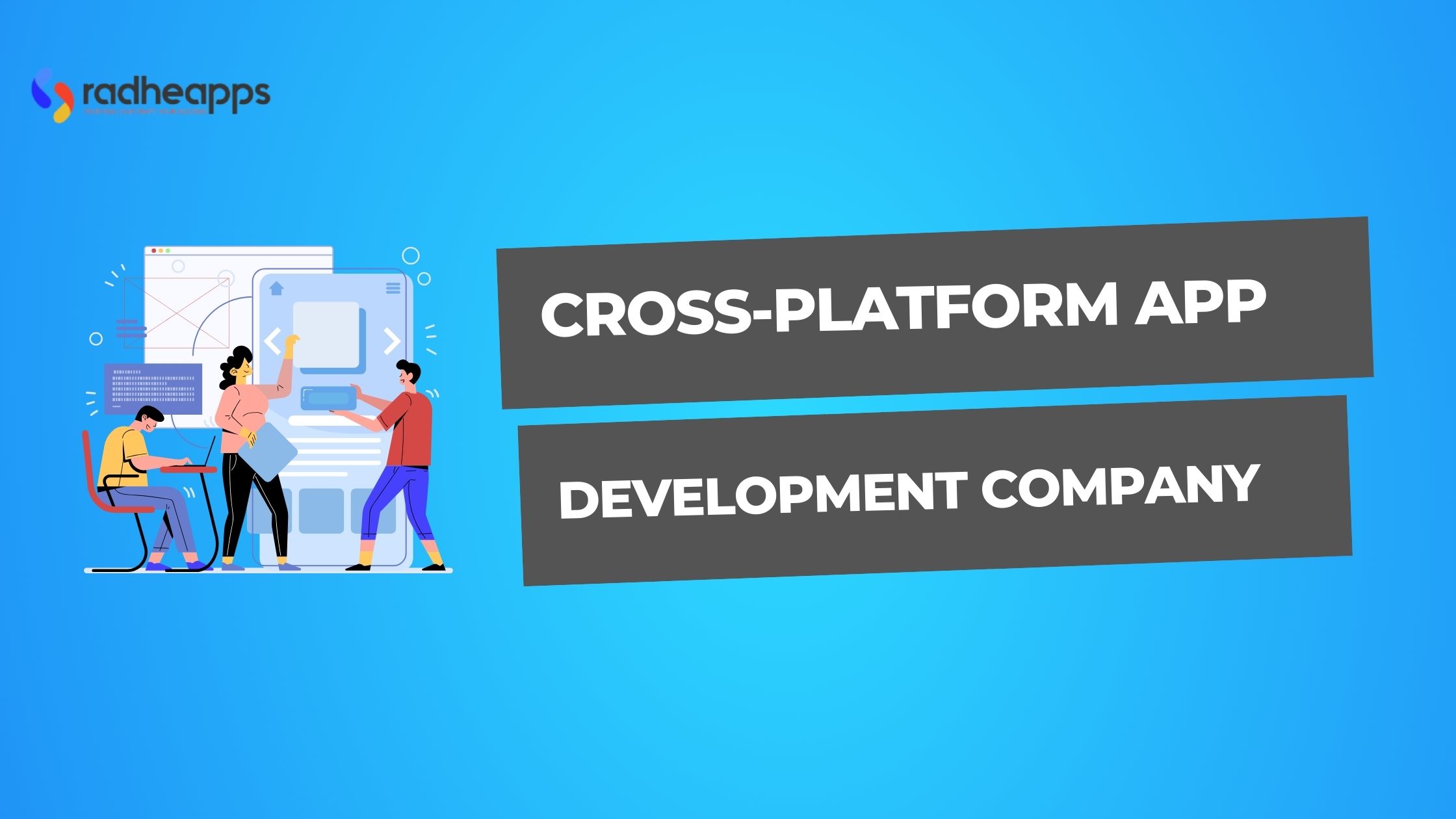Mobile apps are now a big part of everyday life, and they make it easy for businesses to stay connected with their audience. One app can work seamlessly across iOS and Android thanks to cross-platform development.
And this market is only growing. Experts predict the cross-platform app development industry could hit $546.7 billion soon. The importance of choosing the right app development partner has never been greater.
At RadheApps, we specialize in creating custom, high-performance apps that improve your brand. Our cross-platform compatibility and seamless user experiences ensure your app aligns perfectly with the goals of your company.
Ready to bring your app idea to life?
Let’s create something extraordinary together! Reach out today to get started.
In this guide, we’ll walk you through the essentials of cross-platform app development and give you tips on choosing the right team to make your app idea a reality.
TL;DR – Key Services in Cross-Platform App Development Company
In case you want to have a quick look at the services, it is mentioned below:
Custom Mobile App Development
Testing and Quality Assurance
API Integration
UI/UX Design
Maintenance and Support
What Is Cross-Platform Mobile App Development?
Cross-platform app development means creating an app that works well on multiple platforms like Windows, iOS, and Android.
Instead of building separate versions for each device, developers use a single codebase to build one app that runs on all of them.
This approach saves time, reduces costs, and makes the process a whole lot simpler.
It speeds up development, so your app reaches users faster. In short, cross-platform development is like making one app that fits right in on different devices.
List of Key Services in Cross-Platform App Development Company
Companies that specialize in cross-platform app development provide a range of services to assist businesses in developing applications that work well on several platforms.
Key services usually offered include the following :
Custom Mobile App Development
Custom mobile app development is one of the main services provided by cross-platform app development firms.
These businesses collaborate extensively with customers to fully grasp their unique company and user needs before developing custom apps that support their goals.
Testing and Quality Assurance
Before an app is released, it goes through extensive testing to ensure its quality, usability, and performance. These tests ensure that the software functions properly on both Android and iOS.
Additionally, they assist in identifying any problems early on, which saves time and addresses more serious concerns later.
API Integration
APIs are essential for increasing the functionality of apps and enabling third-party integrations. To make sure your app integrates seamlessly with other apps, services, or databases, cross-platform app development businesses frequently offer API integration services.
APIs can increase user engagement, enhance app performance, and facilitate real-time data changes with features like social network sharing and payment gateways.
UI/UX Design
The process of designing the user interface (UI) and user experience (UX) is a crucial part of app development. Cross-platform development companies offer expert UI/UX design services to create visually appealing, user-friendly, and intuitive apps. These designs provide customers with a satisfying experience on all platforms and gadgets.
You can turn your concepts into compelling, useful digital solutions using RadheApps. Our team creates intuitive, user-centered experiences that boost your brand and provide results, from custom app development to outstanding UI/UX design.
Book an appointment with us Today!
Maintenance and Support
A cross-platform app development company usually offers ongoing maintenance and support after launch. Apps need regular updates to fix issues, add new features, improve performance, and stay compatible with the latest OS versions.
Comparison Between Cross-platform vs. Native App Development
Native versus cross-platform development differs greatly based on the operating system you plan to use.
Native mobile applications are made specifically for a particular operating system, like Android or iOS.
On the other hand, cross-platform applications are compatible with various operating systems, enabling companies to target many platforms using a single source code.
Let’s now talk about what native app development is, how it differs from cross-platform development, and the advantages and disadvantages of each strategy
What is Native App Development?
The process of developing a mobile application specifically for a platform, such as iOS or Android, is known as native app development.
Native apps offer greater user engagement than hybrid apps because they are designed especially for the operating system.
Compared to their web-based competitors, which have to work on multiple platforms, native mobile apps typically look and perform better.
Key Differences Between Native and Cross-Platform Development
| Factors | Native App | Cross Platform App |
| Reusability of code | Your committed team must create distinct native apps for every OS system as these solutions don’t allow for code reusability. | A single code base and code sharing across various mobile platforms are highly valued in cross-platform app development. |
| Cost | Although native mobile application development can be expensive to develop, it results in apps with excellent performance. | Cross-platform app development can cost half as much as developing a native app. However, there are unstated development expenses when using native plugins. |
| Functionality & Performance | Even for sophisticated AR, VR, and ML-powered technologies, native app development guarantees unmatched performance. | On the other hand, having too many native add-ons could cause minor performance issues in cross-platform app development. |
| Maintenance & Updates | Backward compatibility is a feature of native mobile apps that guarantees your software will function properly on any device. | If you need to synchronize the updates of numerous third-party libraries and native plugins, this may prove challenging. |
| Time to Market | Although they take longer to design, native mobile apps offer consistent speed. | Your solution will be developed about 30% faster than a native app if it doesn’t require any native features. |
Popular Frameworks in Cross-Platform Development
To succeed, whether you’re developing an app for iOS, Android, or desktop, you need to develop an app that can reach as many users as possible without starting from scratch for each platform.
The use of cross-platform frameworks reduces development time, costs, and improves the efficiency of development processes.
The advantages and disadvantages of each cross-platform framework make choosing the right one for a project difficult.
For your convenience, here is a brief description of the most popular frameworks in cross-platform development!
Flutter
A flexible UI toolkit, Flutter was developed by the corporate giant Google.
Its principal objective is to enable developers to create natively built programs that support desktop, online, and mobile platforms, all of which can be operated with ease using a single, unified codebase.
So, you might wonder, “What is all the hype about?”
Well, Flutter’s hot-reload function is the reason why people adore it! Additionally, it enables developers to view changes quickly without having to restart the application, which speeds up and improves productivity throughout the process.
The widget-based framework of Flutter makes it easy to design visually appealing interfaces that function well across several platforms. It is well-liked since it is adaptable, simple to use, and excellent for creating unique designs.
Ionic
Ionic is an effective framework that uses web technologies like HTML, CSS, and JavaScript to facilitate the building of cross-platform apps. It attempts to minimize the inherent difficulties of cross-platform development while combining its benefits.
Now, you might wonder, “What’s the role of an Ionic Developer?”
Ionic developers create intuitive, user-friendly mobile applications using the framework. For the iOS and Android platforms, they collaborate closely with other developers to design, create, and test mobile applications.
A developer in this field must have experience developing and implementing Ionic, HTML, CSS, JavaScript, and AngularJS applications.
React Native
React Native enables programmers to create iOS and Android mobile apps using JavaScript. Developers can create browser extensions and extend their mobile apps to desktop and online apps.
React components, which are essential to React Native, let developers seamlessly work with existing native code. It is to improve the framework’s native API integration and enable much faster work for current native teams.
React components and native code work together to extend the capabilities of native app development to new development teams, which makes it a very effective and adaptable mobile app development solution.
Xamarin
Built on the Microsoft technology stack, this relatively new tool has a developer community of over 1.4 million members. It offers the Xamarin Platform, which includes Xamarin.
Android, Xamarin.iOS, and Xamarin, to software developers. To test apps on actual devices, use Forms and Xamarin Test Cloud.
Together, it offers development tools such as Xamarin Studio, Visual Studio, Xcode, and Android SDK Tools.
To put it briefly, Xamarin is an excellent option for cross-platform app development since it enables you to construct native apps using .NET or XAML markup languages.
PhoneGap
The Cordova company distributes the open-source PhoneGap platform. Developers can create applications using a single codebase that is cross-platform compatible.
It makes it simple for developers to construct hybrid applications by reusing their previous web development abilities, which are supported by several languages like HTML and CSS.
It is the most widely used cross-platform framework that uses desktop and developer apps to convert our HTML, CSS, and JavaScript files into an application in a matter of minutes.
It gives developers access to native plugins and containers that let them use mobile resources like a camera, compass, etc.
How to Choose the Best Cross-Platform App Development Company
One of the very important queries, nonetheless, is how to pick the top app development firm for your project.
Not every app developer is created equal. It’s crucial to assess how well these agencies match your vision, brand, and technical specifications.
Here are the four most crucial factors to take into account when making this tough decision:
Portfolio
Look for apps with a well-designed user interface when perusing a company’s portfolio of clients and projects. The quality of user interaction with features and resources must be a dependable aspect of your program.
Take a look at the apps that other app developers have recently created for their clients. Consider apps that are similar to the ones you have in mind when asking for samples of their work.
Client Reviews
Another smart move is to ask for recommendations from past customers. Find app developers who offer their customers’ contact details so you can get authentic reviews.
There is no better method of assessment than this. Client satisfaction is a genuine indicator of a business’s success.
Industrial Experience
It could be crucial to take into account whether an agency has experience in the same field as yours. If they’ve got experience in your field, chances are they’ve handled similar services or faced issues like the ones your app aims to solve.
In addition to saving development time, this can help the app be of higher quality.
After-launch assistance
A fantastic app created today can quickly become outdated. Additionally, mobile operating systems receive many updates annually.
Apps are not flawless, so even the best ones can have issues. Make sure you engage with a competent agency when you need to update or modify the product.
Best Practices for Cross-Platform App Development
Developers should adhere to these best practices to produce successful cross-platform applications :
Select the Appropriate Framework
The selection of the appropriate development framework is crucial. Numerous well-known cross-platform frameworks exist, such as Ionic, Flutter, Xamarin, and React Native.
When assessing the benefits and drawbacks of each, consider the needs of your project.
Preserve a Uniform UI/UX
Consistency is crucial when developing for a variety of platforms. User experience and user interface should be the same across all platforms for your app.
Platform-specific design rules are followed while using cross-platform components and layouts.
Enhance your Performance
Keep an eye on the app’s performance. Occasionally, cross-platform applications may experience performance problems. Use native modules as needed, optimize your code, and use performance profiling tools to find and fix bottlenecks.
Conduct Extensive Testing
In cross-platform development, the stage of testing is essential. To find and fix compatibility issues, test your app across a range of devices, screen sizes, and operating system versions through manual testing. This procedure can be streamlined with automated testing tools.
Conclusion
Cross-platform app development allows you to launch your product across numerous devices and reach as many users as possible.
When you lack the funds or time for distinct native development teams for every platform, it’s a fantastic alternative.
In this case, outsourcing mobile app development might be helpful. If your internal team lacks experience with cross-platform frameworks, a knowledgeable outside team can quickly and easily get you up and running.
Do you need a custom-built application or software solution to transform your business?
Partner with RadheApps and leverage the proven expertise in creating innovative, high-impact applications tailored to your unique needs.
Frequently Asked Questions (FAQs)
What Are the Benefits of Cross-Platform App Development?
A cross-platform approach has plenty of perks.
You get lower costs, faster development, simpler deployment, and easier access to ongoing support. Plus, it means you can launch on multiple platforms at once without starting from scratch for each one.
How Do You Balance Performance and Usability in Cross-Platform Apps?
Cross-platform apps must optimize their code to guarantee speed while preserving a smooth user experience to strike a balance between usability and performance. Also, to ensure that the app works well without sacrificing usability, testing, and user input are essential.




